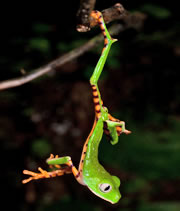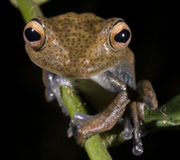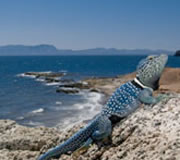|
OPPORTUNITIES
Join Our Field Team
Photography Workshops
Intern or Volunteer
Educational Outreach
e-Newsletter
Join a Photographic
Expedition
to the
Amazon Rainforest



|
Studies of Ecuadorian Reptiles and Amphibians:
Conservation of Critically Imperiled Ecosystems
We are in our eigth year of study in Ecuador documenting the incredible diversity of life in fragile and imperiled ecosystems. Our goals include discovering new species, understanding patterns of biodiversity, and providing sound management recommendations to save wild animals and places. So far, we have recorded nearly 6,000 animals in these rainforests, taken some 25,000 "keeper" photographs and discovered over 30 species previously unknown to science. Read on with the links to your right to find out more, and about how you can help! in fragile and imperiled ecosystems. Our goals include discovering new species, understanding patterns of biodiversity, and providing sound management recommendations to save wild animals and places. So far, we have recorded nearly 6,000 animals in these rainforests, taken some 25,000 "keeper" photographs and discovered over 30 species previously unknown to science. Read on with the links to your right to find out more, and about how you can help!
Our 2011 expeditions will be visiting two sites. In the spring we will work at Lalo Loor Reserve and Jama Coaque Reserve. On the coast of Ecuador, they hold some of the most unique and amazing biodiversity in the world. Our team will be working a 10+ mile transect going from tropical dry forest, through humid forest (a type of rainforest) and even cloudforest. We will be determining patterns of biodiversity, discovering new species, and figuring out what can be done to save these fragile ecosystems.
medikament blähungen by Onfy
In summer 2011, our research expedition will vist the Amazon rainforest at Rio Bigal Biological Reserve--one of the most biodiverse spots in the world. See how you can join our rainforest research team! See our application page for details.
Make our 40 peaks in 40 nights project a success! Donate today.
Photo galleries from our 2007-2009 expeditions are online.
Find out more about our work in our report of initial findings, available in English (pdf) and Spanish (pdf).
|
ECUADORIAN BIODIVERSITY PROJECT
Project Home
40 Peaks in 40 Nights
Documenting Biodiversity
Species Discovery
Study Sites
For its size, Ecuador is the most biodiverse country on earth. It holds about 8% of all the species of amphibians on Earth and 16% of bird species--all in a country about the size of Arizona!
Many tropical ecosystems are under dire peril--our study regions in western Ecuador are over 95% deforested!
You can help with this important work -- donate today.
Find out how you can participate in our research expeditions to the rainforests of Ecuador.
See photo galleries from our Ecuadorian research expeditions:
January 2008
Summer 2008
January 2007
May 2007
August 2007
|

